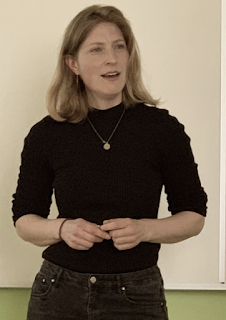 |
| Sophie Stammers |
On Tuesday 15th July the University of Nottingham held a workshop on Implicit Cognitions, organised by network member Jules Holroyd. The workshop was part of the Leverhulme funded research project on Bias and Blame.
Sophie Stammers (KCL) started the afternoon with her paper ‘Not Conscious, Not Responsible?’. Stammers critically examined the account of bias and responsibility given in Neil Levy’s book (which he has presented on this blog). Stammers put pressure on three claims of Levy’s:
1) Agents are not conscious of the morally relevant facts regarding attitudes which generate implicitly biased actions.
2) Implicitly biased actions are generated by attitudes which are inconsistent with the agent’s endorsed values.
3) Implicitly biased actions are generated by attitudes which are not responsive to reasons at the personal-level.
With respect to 1), Stammers discussed the specificity of the morally relevant facts, and depending on this, whether agents might after all be aware of such facts. With respect to 2), she discussed what is meant by an agent’s endorsed values. And with respect to 3) she gave two interpretations of the claim by distinguishing two ways of interpreting what it means for actions to not be responsive to reasons. Stammers concluded with the claims that agents might be conscious of some morally relevant facts, that some aspects of their actions are assessable, and that implicit biases might be no less responsive to reasons than some explicit attitudes (the latter of which we are morally responsible for).
Next up was Robin Scaife (Sheffield), with his talk ‘Implicit Bias and Blame: An Experimental Design’. In his talk Scaife presented his work with collaborators Jules Holroyd and Tom Stafford. Holroyd, Scaife, and Stafford were seeking feedback on the experimental design they had created for an experiment on bias and blame to run at the end of the year. They were interested in whether blaming people for their implicit biases helped or hindered the expression of such biases.Anna Ichino closed the workshop with her paper ‘Religious (So-Called) Beliefs and Imagination'. Ichino has blogged about her work on this issue. She defends the view that the cognitive attitudes usually thought to be religious beliefs, are – or at least many of them are – not actually beliefs, but imaginings. In her paper she considers three reasons for thinking that such attitudes are beliefs; sensitivity to evidence, holistic coherence, and sincere avowal. Ichino put pressure on the claim that these three features held of religious attitudes, arguing that they share many more features of paradigmatic imaginings than beliefs.
You can follow the progress of the Bias and Blame project by keeping up to date with the project blog.
You can follow the progress of the Bias and Blame project by keeping up to date with the project blog.